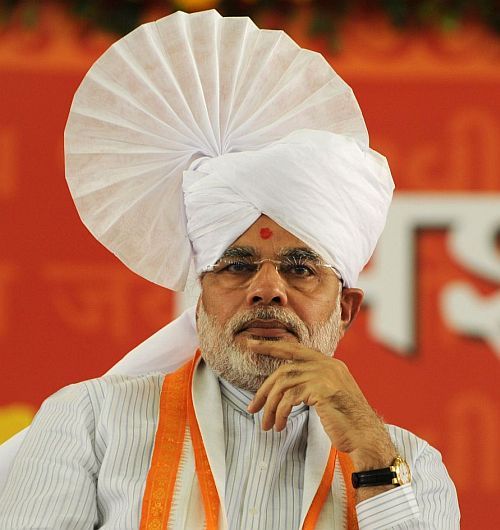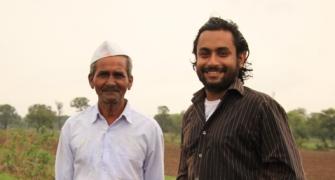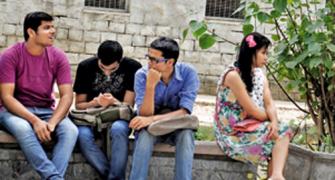
A time comes when the distance between words and meaning becomes unbridgeable. Or, words become shells, which hide the real intent of the speaker. To understand how language works in the case of a person like the present prime minister, you’ll have to analyse the way language is practised by the RSS, says Apoorvanand.
The media did report the interview of Prime Minister Narendra Modi, published in the latest issue of Time magazine, but we did not see many editorial comments. No opinion pieces, either. Every inch and second of the media time went to the convicted-and-not so convicted fan of the PM, who, at the moment, seems to command a larger fan following than the PM himself.
Where does one go then but the social media to look for reactions? I am quoting one of the comments without the name of the author for the fear of him being hounded by the cyber-brigade of the PM, 'Narendra Modi says terrorism must be de-linked from religion'.
And then rolls on the floor laughing when he sees the answers scripted for him and published in Time on his behalf!
Meanwhile after a brief panic attack the Sangh brigade also sees the humour and joins in the laughter!
Amit Shah sheepishly says, "Saheb, is baar toh jumlon ki hadd kar di aapne" (Sir, you went overboard with your comments).
Babu Bajrangi, upon hearing what Modi had to say, feels in addition to slowly going blind he is also slowly but surely going deaf. And then somebody assures him "jumla hai". His faith in Narendrabhai is restored and he looks forward to the rest of his three month long bail.
Maya Kodanani is also relieved and sees her bail as just round the corner.
Quoting an old Bee Gees song, Rajdeep Sardesai says 'Its only words.... it's only words. And words are all I have to take your heart away.’
Tweaking an old song from a Bollywood movie, a friend writes, Baatein hain, baaton ka kya.
Recently, another friend of the PM had lamented that all he was busy doing was managing headlines. It can be said that the interview Time has published to mark the completion of the first year of the Modi government is full of potential headlines.
‘The Constitution is the only holy book for me’, the magazine reports him saying. In India, holy books are to be worshipped and then kept in a ‘holy corner’ of the home, away from the daily worldly hustle and bustle. They are there, but not as guide to action. And pray, why did the man take another ‘holy book’ with him on his foreign tours, namely Bhagwad Gita as a gift from the head of the state of India to other heads of states and declare that this is the highest achievement of Indian civilisation? While doing so, why did he feel the need to mock the ‘shopkeepers’ of secularism in India?
‘My government is for the poor’ is what he claims. The poor believe otherwise. The farmers across India have been relentlessly protesting his move to bring his favourite land bill which disempowers them. People have seen that he cannot hide his glee when in the company of the mighty rich. Tribals are apprehensive that through new moves, the government would make it easier for the industry and the State to force them out of their habitation. Even people in the cities, home-buyers, are angry with him for bringing a bill which leans heavily in favour of the builder lobby. A perception has taken roots that the government is pro-rich.
‘My government does not discriminate against minorities, nor do we allow negative campaign against them,’ he asserts. Minorities have other stories to tell. Apart from the hate that the senior members of the ruling party spew regularly against them, they have been braving increased physical attacks on them and their property.
‘Democracy is in our DNA and therefore, we do not need dictatorship.’ Go ask the old-timers of the Bharatiya Janata Party itself. Fear stalks them and they are not sure while talking to other party members if they would be reported or not. The point is, you do not need to declare yourself a dictator when you can practise dictatorship in democratic garb.
Then he chokes. And people laugh. Unfair? He is talking about the early influences on his life. He says that Vivekananda has been a great influence on him. But does not say a word about the Rashtriya Swayamsevak Sangh which has been his mentor, home, where he has been shaped. Would the RSS complain about this lapse on part of its prodigy or pat him for having mastered the art of disguise?
The interviewers cannot be expected to question his answers. Not do they seem sufficiently equipped intellectually. Otherwise, they could have seen though his shallow understanding of Indian culture. He sounds utterly pedestrian while discussing Charvaka, the great materialist philosopher.
A time comes when the distance between words and meaning becomes unbridgeable. Or, words become shells, which hide the real intent of the speaker. To understand how language works in the case of a person like the present prime minister, you’ll have to analyse the way language is practised by the RSS. From Hedgewar to Golwalkar to Atal Bihari Vajpayee to Lal Krishna Advani to the present prime minister.
To understand how hate-mongers turn into sages, one will have to have Orwellian genius. It is waiting to be articulated in our land.










